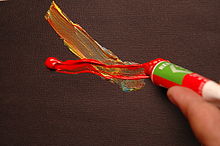
Back لون أكريلك Arabic Akrilik BS Pintura acrílica Catalan Akrylátová barva Czech Akrylmaling Danish Acrylfarbe German Akrilfarbo Esperanto Pintura acrílica Spanish Akrüülvärv Estonian Pintura akriliko Basque



Acrylic paint is a fast-drying paint made of pigment suspended in acrylic polymer emulsion and plasticizers, silicone oils, defoamers, stabilizers, or metal soaps.[2] Most acrylic paints are water-based, but become water-resistant when dry. Depending on how much the paint is diluted with water, or modified with acrylic gels, mediums, or pastes, the finished acrylic painting can resemble a watercolor, a gouache, or an oil painting, or it may have its own unique characteristics not attainable with other media.
Water-based acrylic paints are used as latex house paints, as latex is the technical term for a suspension of polymer microparticles in water. Interior latex house paints tend to be a combination of binder (sometimes acrylic, vinyl, pva, and others), filler, pigment, and water. Exterior latex house paints may also be a co-polymer blend, but the best exterior water-based paints are 100% acrylic, because of its elasticity and other factors. Vinyl, however, costs half of what 100% acrylic resins cost, and polyvinyl acetate (PVA) is even cheaper, so paint companies make many different combinations of them to match the market.[3]
- ^ Here, the word describes a technique that allows more time before the paint dries.[citation needed]
- ^ Izzo, Francesca Caterina; Balliana, Eleonora; Pinton, Federica; Zendri, Elisabetta (2014-12-20). "A preliminary study of the composition of commercial oil, acrylic and vinyl paints and their behaviour after accelerated ageing conditions". Conservation Science in Cultural Heritage. 14: 353–369 Paginazione. doi:10.6092/ISSN.1973-9494/4753. Archived from the original on 2021-11-07. Retrieved 2021-11-05.
- ^ Sickler, Dean (Spring 2002). "Water-based Alchemy by Dean Sickler". Dundean.com. Archived from the original on August 29, 2012. Retrieved August 11, 2012.
© MMXXIII Rich X Search. We shall prevail. All rights reserved. Rich X Search